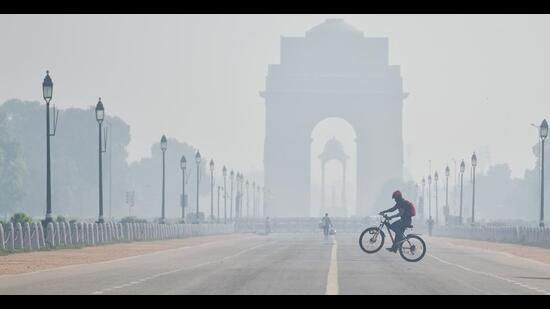Green issues not on the priority list of parties
Despite scientific data on the deteriorating condition of the environment, green issues have never been a concern for political parties during elections, and environmental and health issues have largely remained outside the framework of electoral politics
In its annual report, State of Global Air Analysis 2020, the United States-based Health Effects Institute (HEI) said that 93% of India’s population is exposed to the air containing at least 35µg/m3 concentration of PM2.5 (particulate matter of the size of 2.5 microns). According to the World Health Organization (WHO), the upper annual limit for PM2.5 is 5µg/m3, and the 24-hour ceiling is 15µg/m3. On average, Indians lose 1.51 years of their life to air pollution, added the HEI report, released last week.

Other than the impact on the health of citizens, air pollution also harms the country’s economy. According to the Health and economic impact of air pollution in the states of India: The Global Burden of Disease Study 2019, the lost output from premature deaths and morbidity attributable to air pollution accounted for economic losses of $28.8 billion and $8·billion, respectively, in India in 2019. This total loss of $36.8 billion was 1.36% of India’s Gross Domestic Product (GDP). The economic loss as a proportion of the state GDP varied 3.2 times between the states, ranging from 0.67% to 2.15%, and was highest in the low per capita GDP states of Uttar Pradesh, Bihar, Rajasthan, Madhya Pradesh, and Chhattisgarh. Delhi had the highest per capita economic loss due to air pollution, followed by Haryana in 2019, with 5.4 times variation across all states.
The high burden of death and disease due to air pollution and its associated substantial adverse economic impact from loss of output could impede India’s aspiration to be a $5-trillion economy by 2024, the study said. A successful reduction of air pollution in India through state-specific strategies would lead to substantial benefits for both the health of the population and the economy, it added.
Indians have the constitutional right to clean air. In the directive principles of State policy, Article 48-A instructs the State to protect and improve the environment and safeguard the country’s forest and wildlife resources.
After the Stockholm Conference in 1972, some significant environmental laws were enacted in India: The Water (Prevention and Control of Pollution) Act, 1974; the Air (Prevention and Control of Pollution) Act, 1981; and the Environment Protection Act, 1986, to name a few. The 2006 National Environment Policy represents the first strategic initiative for environmental protection aimed at integrating environmental protection with economic and social development, and speaks of inter-generational and intra-generational equity.
Despite scientific data on the deteriorating condition of the environment, green issues have never been a concern for political parties during elections, and environmental and health issues have largely remained outside the framework of electoral politics.
For example, five states — Goa, Manipur, Uttar Pradesh (UP), Uttarakhand and Punjab — are voting for new state governments. All five face severe environmental problems, including air pollution, and are bound to face more in the coming years due to the climate crisis. Yet, there was hardly any discussion on their green challenges and what needs to be done to address them in the run-up to the elections. Some parties mentioned environmental issues in their manifestoes, but there was no robust campaigning around them. Some of the country’s most-polluted cities, such as Ghaziabad, Bulandshahr and Meerut, are in UP, but the dirty air received little attention during the campaign.
Why is this happening election after election? Is clean air a priority for voters at all or not? Is extensive media coverage of issues such as inflation, unemployment and national security sidelining other critical issues? Or is it the lack of awareness among voters that is allowing political parties to sideline green issues? While there are no straight answers to these difficult questions, it is imperative that environmentally conscious voters continue to put pressure on political parties to prioritise clean air and other health and environmental issues in their electoral manifestoes and campaigns. Otherwise, Indians will continue to suffer.
Rekha Saxena is professor, department of political science, University of Delhi
The views expressed are personal





